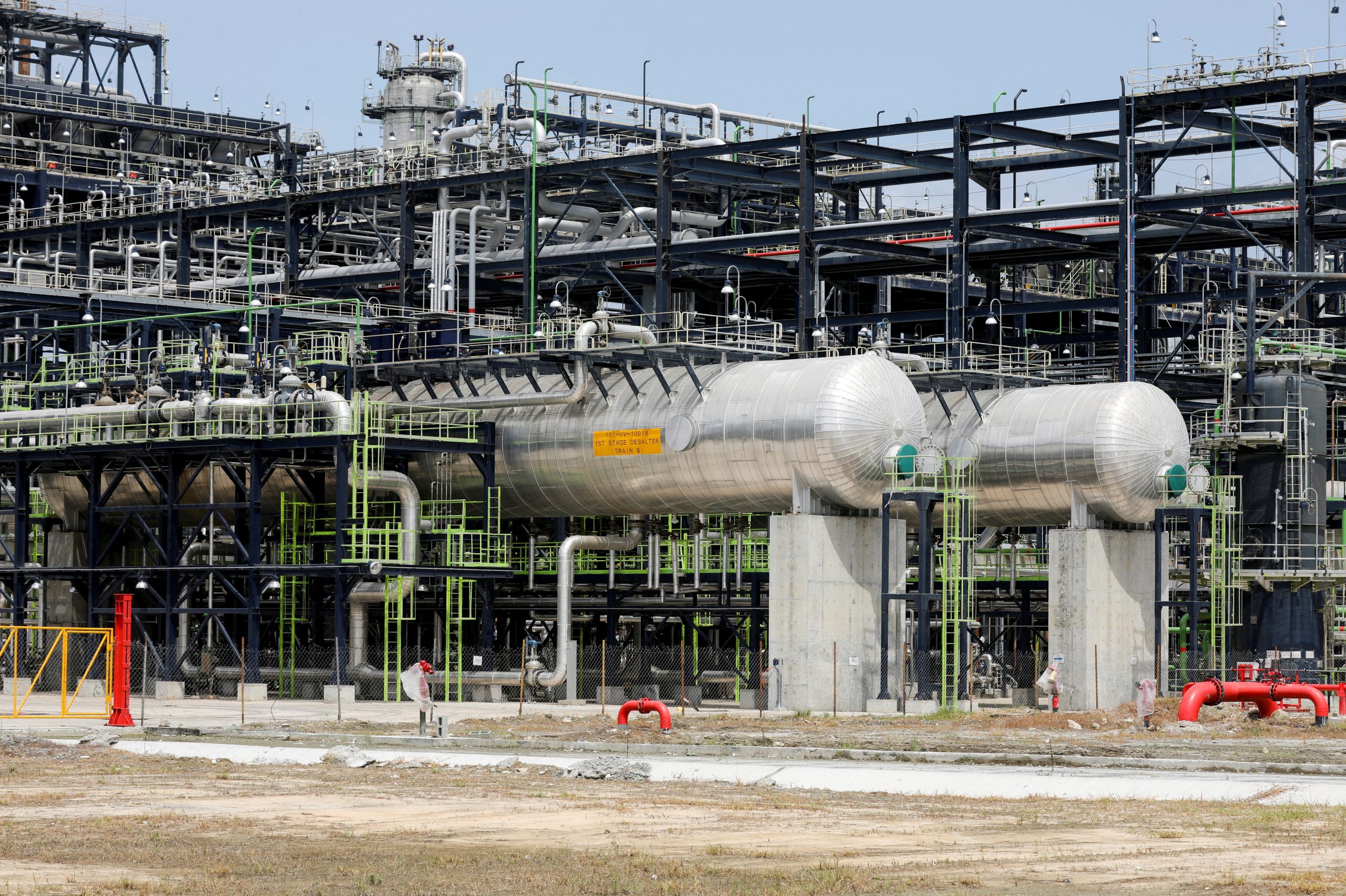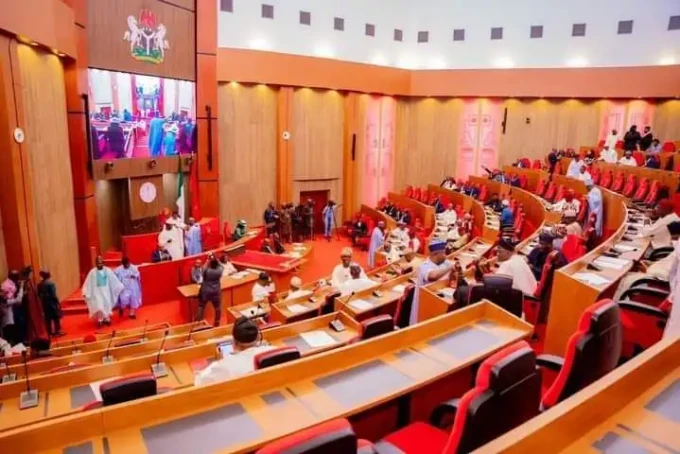In a major economic development, the Federal Government of Nigeria has entered into a landmark agreement with the Dangote Refinery to pay for crude oil in local currency (Naira). This historic deal allows Africa’s largest refinery, with a capacity of 650,000 barrels per day, to receive a staggering 24 million barrels of crude oil over October and November 2024. The move represents a transformative shift in Nigeria’s oil industry and is expected to have a significant impact on the region’s import and export markets.
According to Bloomberg, the refinery, located just outside Lagos, will process up to 400,000 barrels of crude daily in the coming months. The refinery’s operations have the potential to reshape Nigeria’s energy sector and reduce the country’s dependency on imported refined products. This agreement underscores Nigeria’s commitment to boosting local production capacity, enhancing energy security, and promoting economic stability.
The Presidential Committee on the Sale of Crude Oil and Refined Products recently confirmed that NNPC Limited would begin supplying 385,000 barrels of crude oil per day to the Dangote Refinery starting October 1, 2024. The agreement, a first of its kind, stipulates that the transaction will be settled entirely in Naira. This shift away from foreign currency payments aligns with the Federal Government’s efforts to bolster the value of the Naira and reduce Nigeria’s reliance on the US dollar for oil transactions.
A government spokesperson elaborated, stating: “From October 1, NNPC will commence the supply of about 385,000 barrels per day (kbpd) of crude oil to the Dangote Refinery, to be paid for in Naira. In exchange, the Dangote Refinery will provide premium motor spirit (PMS) and diesel of equivalent value to the domestic market, also payable in Naira.” This mutually beneficial arrangement is expected to ease fuel scarcity and stabilize prices in the local market, providing relief to consumers.
The agreement has been widely praised as a strategic move to strengthen Nigeria’s economic resilience. By encouraging the use of the local currency for significant transactions, the government aims to reduce pressure on the foreign exchange market and create a more stable economic environment.
Trending discussions across social media and economic forums highlight the potential benefits of this partnership, emphasizing how it could reshape Africa’s energy landscape. The Dangote Refinery’s increased output, coupled with this innovative payment mechanism, marks a bold step towards economic self-sufficiency and energy independence for Nigeria.












Why should a private company like Dangote get special treatment from the government? Its not fair to other businesses.
Why should a private company like Dangote get special treatment from the government? Its not fair to other businesses.
I think its unfair for the government to prioritize a single company like Dangote. What about other local businesses?
Why should Dangote get special treatment for Naira payment deal? What about other Nigerian businesses? Unfair advantage?
Why are we celebrating a billionaire striking a deal with the government? Shouldnt we be questioning the fairness and transparency of such agreements?
I dont understand why Dangote Refinery gets special treatment. Other companies should get fair opportunities too. Seems fishy.
Dangote Refinery brings jobs and revenue. Lets focus on progress, not jealousy.
I dont see the big deal. Why is everyone so excited about this? Its just another business transaction, nothing groundbreaking.
I find it ridiculous that the government is giving special treatment to Dangote. What about other businesses? Equality, anyone?
Dangote gets all the perks while the rest struggle. Typical government favoritism at its finest.
I think its unfair that Dangote gets special treatment. What about other Nigerian companies? Is this really promoting equality?
I think its ridiculous that Dangote Refinery gets special treatment with Naira payments. What about other companies? Equality, anyone?
Dangote Refinerys special treatment is unfair. All companies should be equal in payments. Justice matters!
Why is the government prioritizing a deal with Dangote over other local refineries? Seems fishy. #NairaPaymentDebate #QuestioningPriorities
Dangote has the resources to make a significant impact. Lets see how it plays out. #WaitAndWatch
I dont get why Dangote gets special treatment. What about other local businesses? Seems unfair to me.
I dont get why Dangote gets special treatment. What about other local businesses? Seems unfair to me. #EqualOpportunities #ControversialOpinion
This deal seems shady, why should a private company like Dangote get special treatment from the government? #EqualOpportunityForAll
I dont think Dangote should be getting special treatment like this. What about other Nigerian businesses? Seems unfair.
Dangote earned his success. Other businesses should step up their game. Fair is fair.
I dont get why Dangote gets special treatment. What about other companies? Seems unfair and fishy to me.
Is it fair for a private company like Dangote to strike a deal with the government? Shouldnt it be a competitive process?
Why is the government favoring Dangote with this deal? What about other local businesses? Something doesnt add up.
Why is the government prioritizing Dangote over other local refineries? Seems like a shady deal to me. #corruption #Nigeria
I think its unfair that Dangote gets special treatment. Why not strike a deal with smaller local businesses too?
I dont get why Dangote gets special treatment to pay in naira. Shouldnt everyone play by the same rules? #equality
I think its unfair that Dangote gets special treatment for Naira payment while others have to use foreign currency. Equality, anyone?
I think its unfair that Dangote gets special treatment. What about other Nigerian businesses? Equality for all!
Dangote earned his success. Others should step up their game instead of complaining.
I think its unfair for Dangote to get special treatment. Other companies should have the same opportunity for groundbreaking deals.
I think its outrageous that a private company like Dangote Refinery gets special treatment from the government. What about other businesses?
This deal could have massive impacts on Nigerias economy. Exciting times ahead for the oil and gas industry!
Why is the government striking deals with Dangote when there are other pressing issues to address? Priorities, people!
Why is the government striking deals with Dangote instead of focusing on public infrastructure? Priorities seem off.
This deal could either boost the economy or lead to dependence on a single entity. Whats your take?